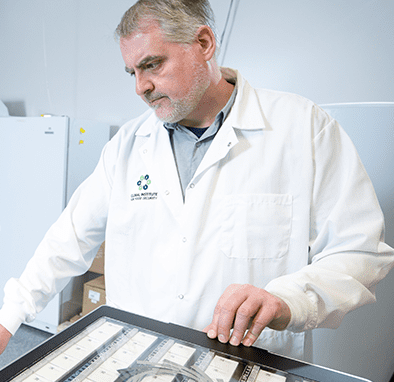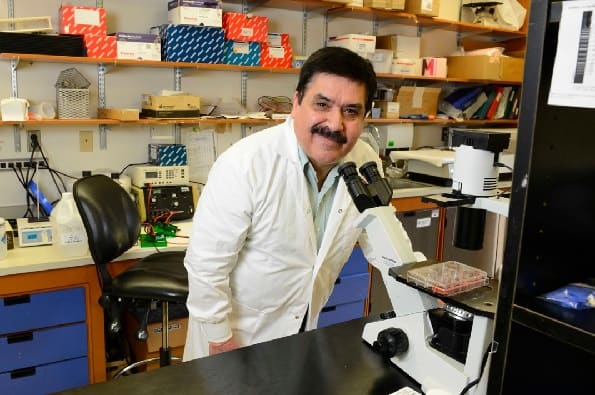
Dr. Andrew Sharpe with Global Institute for Food Security (GIFS) at USask was awarded a total of $764,130 by ADF. (Photo: David Stobbe)
(This news release was originally published by the University of Saskatchewan)
University of Saskatchewan (USask) researchers have been awarded $4.2 million to develop livestock-related innovations that range from improving forage feed to advancing work on vaccines to tackle the global spread of African swine fever (ASF).
ADF is supported through the Canadian Agricultural Partnership, a five-year, $3-billion investment by federal, provincial, and territorial governments to strengthen and grow Canada’s agriculture, agri-food and agri-products sectors. This includes a $2-billion commitment cost-shared 60 per cent federally and 40 per cent provincially, with a $388-million investment in strategic initiatives for Saskatchewan agriculture.
The ADF livestock research projects also were awarded additional industry co-funding by: Saskatchewan Cattlemen’s Association (SCA) $447,956; Saskatchewan Forage Seed Development, $3,500; and Sask Milk, $31,500.
“Alfalfa cultivation is not only economically important in North America, it also offers the potential to use marginal lands affected by salinity, and improve the quality soil by fixing nitrogen,” said Sharpe.
Researchers will use new sequencing technologies to develop high-quality genome assemblies currently unavailable in Saskatchewan-adapted germplasm. These new reference assemblies will be used as a foundation for genomic analysis of alfalfa and for application in plant scientist Bill Biligetu’s alfalfa breeding program at USask’s Crop Development Centre.
The second project, awarded $371,739 by ADF, has Sharpe, co-principal investigator Biligetu and their team developing new foundational genomic resources for hybrid wheatgrass, a palatable, perennial grass forage crop.
“We will use state-of-the-art applied genomics to create the first extensive molecular breeding resources for hybrid wheatgrass and its parental ancestors,” said Sharpe. “This project will generate genome assemblies, identify markers to assist breeding, develop accurate predictive models for the breeding process, and explore the wealth of genetic diversity available in gene banks to introduce new gene variants that combat abiotic and biotic stresses.”
Suresh Tikoo, Vaccine and Infectious Disease Organization (VIDO) has been awarded $140,000 by ADF to develop a continuous porcine cell line to grow African swine fever virus, a devastating viral disease that causes nearly 100 per cent mortality in pigs.
Currently there is no effective vaccine or treatment for ASF.
“The lack of porcine cell lines is a barrier to the development and commercialization of ASF vaccines,” said Tikoo. “This cell line could be used to evaluate virus-host cell interactions and support the commercial production of ASF vaccines to help protect the world swine population.”
ASF is endemic in Africa and spreading through parts of Asia and Europe. It also has recently been found in the Dominican Republic and Haiti, causing heavy economic losses to the pig industry.
Although ASF has not been detected in Canada, it is a significant threat to Canada’s pork industry—for both pig health and for the devastating impact a positive case could have on international market access.
VIDO is the first non-government organization in Canada with permission from the Canadian Food Inspection Agency to work with ASF virus in its containment Level 3 facility.

porcine cell line to grow African swine fever virus.
(Photo: Debra Marshall)
- Wolfgang Köster, VIDO ($300,500 plus co-funding from Sask Milk): Köster’s team is developing a new vaccine to enhance protection of calves against disease caused by Salmonella Dublin, a zoonotic pathogen spreading in Saskatchewan and Alberta. The disease caused by this bacterium can be quite severe in young calves and transmitted to humans through undercooked meat and unpasteurized milk.
- Heather Wilson, VIDO ($210,000): Wilson, co-principal investigator Azita Haddadi and their team is researching administering vaccines directly into the sow uterus at breeding to promote immune responses by transferring antibodies to suckling piglets. This project tests several vaccine formulations to augment immune responses to fully protect sows against reproductive diseases and piglets against neonatal diseases.
- Yanyun Huang, Prairie Diagnostic Services (PDS) ($198,261, plus co-funding from SCA): Huang’s team from the Western College of Veterinary Medicine (WCVM) and Simon Fraser University is developing a genomics-based diagnostic tool to combat reproductive failures in cattle, estimated to cost Canadian ranchers $280 million annually.
- Sarah Wood, PDS ($149,000): Wood’s team aims to determine effective therapeutic doses of antimicrobials for control of the bacterial disease European foulbrood in honeybees in Western Canada. They will test various antimicrobial dosing regimes for treatment of the disease in honeybee larvae, adults, and colonies using previously established laboratory and field models of the disease.
- Dan Columbus, Prairie Swine Centre (PSC) ($273,202): This project examines how dietary protein quality affects gut health in young pigs. To accomplish this, Columbus’s team will use a variety of techniques to identify key factors related to diet that affect gut health, validate these factors in young pigs, and examine dietary strategies that support optimal gut health.
- Jennifer Brown, PSC ($56,000): Brown and her team aim to determine whether providing environmental enrichment to pigs early in life will have a lasting impact on their later behaviour, thus promoting better health and reducing damaging conduct. Specifically, they want to observe if enrichment reduces aggression and tail biting or increases the growth rate.
- Bernardo Predicala, PSC ($186,950): Predicala’s team is investigating novel methods to reduce the emergence and spread of antimicrobial resistance in swine production. Researchers will evaluate the economic benefits and recommend applying intervention measures in commercial pig barns.
- In a second project, which was awarded $151,800 by ADF, his team will conduct optimization and field validation of a rapid diagnostic test kit for Porcine Epidemic Diarrhea virus (PEDv) under Canadian conditions. Accurate detection of PEDv is essential for implementing rapid control measures for the disease, which has caused significant economic losses to the Canadian swine industry.
- Jon Bennett, College of Agriculture and Bioresources (AgBio) ($289,483): A team led by Bennett will examine how harvest frequency and different plant species affect the integration of native forage varieties into tame pastures. By incorporating native species, they aim to improve late summer forage quality, and carbon sequestration.
- In a second project, awarded $335,588 by ADF, Bennett’s team will work to improve control of leafy spurge, an important noxious weed. They will combine different herbicides and fertilizers to suppress the weed and alter the soil microbiome to reduce leafy spurge’s ability to compete with forage grasses.
- Tim Mutsvangwa, AgBio ($155,832, plus co-funding from Sask Milk): Mutsvangwa’s team will evaluate the effects of applying leaf fungicides to forage barley that’s resistant or susceptible to fungal diseases. The aim is to determine how it impacts the ensiling characteristics and nutritional quality of barley silage, and performance of dairy cows fed the silage.
- Eric Lamb, AgBio ($30,650) Recovery of grassland productivity following fires appears to be linked to post-fire weather conditions. Lamb and his team will determine if this is the case by assembling and analyzing data from past studies of grassland fires. Identifying how post-fire weather is linked to future forage productivity will allow ranchers to forecast productivity and plan their operations accordingly.
- Kathy Larson, AgBio ($44,000): Testing the nutritional quality of feed to develop a balanced ration for livestock is a recommended practice, yet only 40 per cent of western Canadian cow-calf producers annually test their feed. Larson, co-principal investigator Emma Stephens (AAFC-Lethbridge) and their team will survey producers to learn their motivations, barriers and alternatives to feed testing, leading to meaningful tech transfer and the development of standardized protocols.
- Peiqiang Yu, AgBio ($118,100): To provide support for establishing feasible methane mitigation strategies and reduce nitrogen excretion in ruminant livestock, Yu and his team will test, develop and evaluate environmentally friendly, high-value blended feed pellets. They will use a combination of pulse screenings, co-product from bio-oil processing, and commercially available and affordable plant-based extract as a feed additive.
- Mika Asai-Coakwell, AgBio ($68,587, plus SCA co-funding): Gestation length can influence other economically important traits such as birthweight and calving ease in the cattle industry. Asai-Coakwell and her team will conduct genome wide association analyses of sires to identify genomic loci and genes involved in gestational length. This will aid in understanding the genetic regulation of reproductive pathways and result in a new tool to enhance reproductive management in beef herds.
- Murray Jelinski, WCVM ($96,446, plus co-funding from SCA): Lameness is the second most common disease of feedlot cattle, with septic arthritis being one of the most difficult types of lameness to treat. This research, with Jelinski as principal investigator (PI), seeks to determine which antimicrobial therapy is the most efficacious for treating septic arthritis.
- Jelinski and co-PIs Tony Ruzzini (WCVM) and Tim McAllister of Agriculture and Agri-Food Canada were awarded $103,848 plus SCA co-funding for a project that makes their team the first to investigate the horizontal transfer of antimicrobial resistant genes between isolates of Mycoplasma bovis, a key bacterium involved in chronic pneumonia in feedlot calves’ isolates.
- Susantha Gomis, WCVM ($165,000): Finding alternatives to antibiotics in the poultry industry is a priority. Gomis and his team will investigate the novel and industry-feasible use of probiotics during embryonic life of broiler chickens. The aim is to reduce diseases of neonatal broiler chickens by controlling intestinal bacteria, with the goal of using this as a tool to enhance immune responses of poultry vaccines.
- Jaswant Singh, WCVM ($163,602, plus SCA co-funding): To develop a roadmap for implementing remote technologies in the Saskatchewan beef industry, Singh and his team will develop, test, validate and benchmark smart farm technologies such as solar-powered GPS ear tags, feed-bunk proximity sensors in corrals and multi-spectral 3D cameras in pastures and animal handling barns. This enables real-time data gathering and will be key to understanding physical attributes of economically important traits.
- Diego Moya, WCVM ($208,346): Aligned with Saskatchewan’s goals for improving livestock industry competitiveness while also improving animal health and welfare, this project aims to optimize bison feeder performance to sustainably meet the growing demand for bison meat. A multidisciplinary team led by Moya and Gabriel Ribeiro will assess the effects of dietary starch on bison growing performance, rumen health, feeding behaviour, carcass traits, and meat quality and nutritional composition.
View the original news release, published by the University of Saskatchewan.
